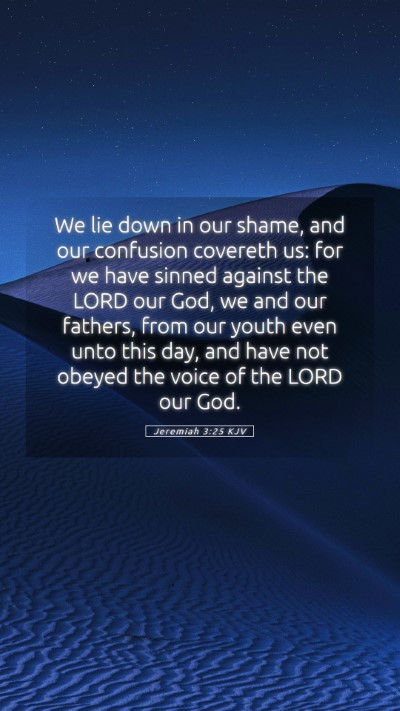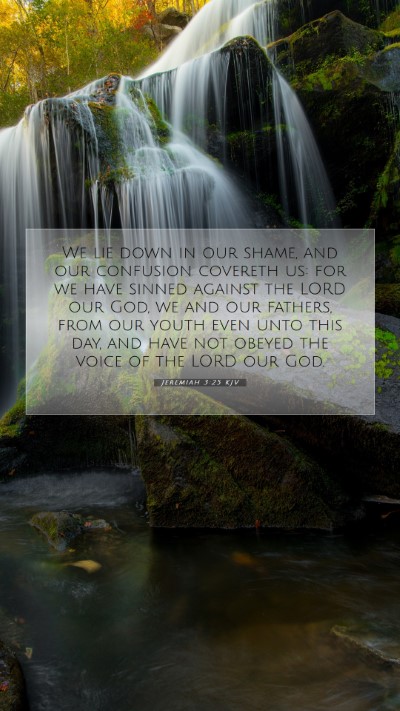Understanding Jeremiah 3:25
Jeremiah 3:25 states: "We lie down in our shame, and our confusion covereth us: for we have sinned against the Lord our God, we and our fathers, from our youth even unto this day, and have not obeyed the voice of the Lord our God." This verse carries profound implications for understanding the themes of shame, repentance, and the repercussions of sin in the context of Scripture.
Bible Verse Meaning
In Jeremiah 3:25, the prophet Jeremiah laments the state of the people of Israel, acknowledging their sinfulness and the shame it brings. This sentiment is reflective of a larger theme in the prophetic writings, where the relationship between God and His people is often characterized by failure on the part of humanity and the grace that God extends despite their repeated transgressions.
Commentary Insights
-
Matthew Henry: Henry perceives the phrase "We lie down in our shame" as an acknowledgment of Israel's disgrace before God. The shame mentioned reflects a deep sense of guilt for abandoning their covenant with God, as evidenced by their actions throughout history. Henry emphasizes that God's people, having turned away from Him, must confront the moral and spiritual decline that has ensued.
-
Albert Barnes: Barnes notes that the term "confusion" suggests a feeling of despair and the consequences of living without the guidance of God. He interprets this shame as arising from the collective sin of the nation, indicating their need for a heart transformation and genuine repentance if they are to restore their relationship with God.
-
Adam Clarke: Clarke provides additional layers to the understanding of this verse by mentioning that this declaration of shame comes from a place of introspection and recognition of their history. Clarke encourages readers to grasp the significance of their forefathers’ sins and recognizes that the cycle of disobedience had severe implications not only for their present but also for future generations.
Key Themes in Jeremiah 3:25
This verse encapsulates several key themes found throughout the Bible:
- Shame and Guilt: It represents an understanding of the weight of sin and its psychological impact on the people of Israel.
- History of Disobedience: The acknowledgment of sin "from our youth even unto this day" points to a persistent pattern of rebellion against God.
- Need for Repentance: The mention of shame indicates a deeper realization that the only way to move forward is through genuine repentance and turning back to God.
- The Nature of God’s Mercy: Implicit in this lament is the hope for restoration, suggesting that despite the severe nature of their sin, God remains prepared to forgive.
Application and Relevance
For contemporary readers, Jeremiah 3:25 serves as a stark reminder of the consequences of turning away from God's teachings. The themes of repentance and acknowledgment of sin remain crucial in personal spiritual journeys. This verse encourages introspection within the context of individual and communal faith practices.
Bible Study Insights
Bible verse interpretations like this one can enhance Bible study groups or even be utilized in online Bible study settings, providing context and understanding for those engaging with difficult passages.
Cross References
This verse can be related to several other scriptures that encapsulate similar themes:
- Isaiah 59:2 - "But your iniquities have separated you from your God; your sins have hidden his face from you, so that he will not hear."
- Hosea 14:2 - "Take with you words, and turn to the Lord: say unto Him, Take away all iniquity, and receive us graciously: so will we render the calves of our lips."
- Psalms 51:3 - "For I acknowledge my transgressions: and my sin is ever before me."
Conclusion
The insights gleaned from Jeremiah 3:25 offer a profound look into the relationship between humanity and the divine. Acknowledging sin, experiencing shame, and seeking repentance are core elements that lead to spiritual renewal and deeper relationship with God. It invites readers to explore the meaning of Bible verses within the broader narrative of redemption and grace.


